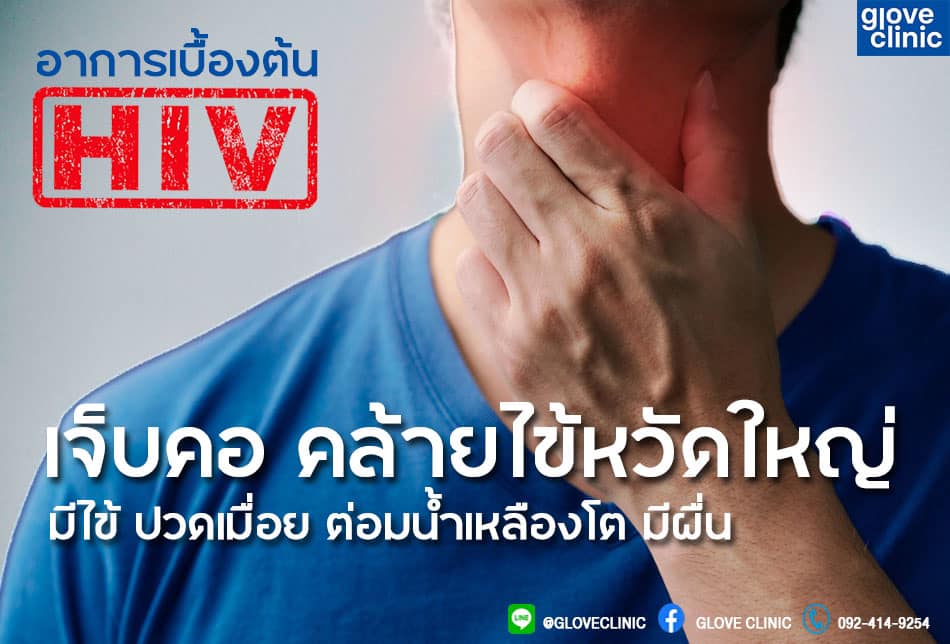294/1 Asia Building (11th Floor), Phyathai, Bangkok
ตรวจ HIV รีวิวความรู้สำหรับการตรวจเอชไอวี (HIV test)
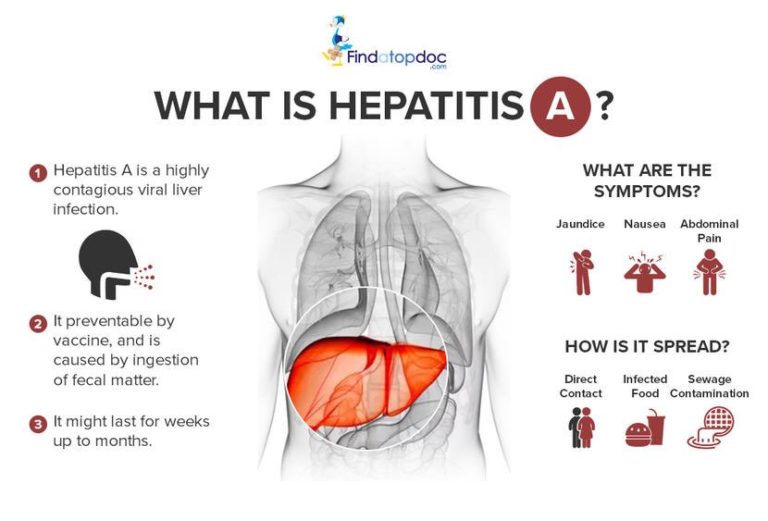
- Hepatitis A is a viral liver disease that can cause mild to severe illness.
- The hepatitis A virus (HAV) is transmitted through ingestion of contaminated food and water or through direct contact with an infectious person.
- Almost everyone recovers fully from hepatitis A with a lifelong immunity. However, a very small proportion of people infected with hepatitis A could die from fulminant hepatitis.
- WHO estimates that hepatitis A caused approximately 7 134 deaths in 2016 (accounting for 0.5% of the mortality due to viral hepatitis).
- The risk of hepatitis A infection is associated with a lack of safe water, and poor sanitation and hygiene (such as dirty hands).
- In countries where the risk of infection from food or water is low, there are outbreaks among men who have sex with men (MSM) and persons who inject drugs (PWIDs).
- Epidemics can be prolonged and cause substantial economic loss.
- A safe and effective vaccine is available to prevent hepatitis A.
- Safe water supply, food safety, improved sanitation, hand washing and the hepatitis A vaccine are the most effective ways to combat the disease. Persons at high risk, such as travelers to countries with high levels of infection, MSM and PWIDs can get vaccinated.
Hepatitis A is a liver disease caused by the hepatitis A virus (HAV). The virus is primarily spread when an uninfected (and unvaccinated) person ingests food or water that is contaminated with the faeces of an infected person. The disease is closely associated with unsafe water or food, inadequate sanitation, poor personal hygiene and oral-anal sex.
Unlike hepatitis B and C, hepatitis A does not cause chronic liver disease and is rarely fatal, but it can cause debilitating symptoms and fulminant hepatitis (acute liver failure), which is often fatal. Overall, WHO estimated that in 2016, 7 134 persons died from hepatitis A worldwide (accounting for 0.5% of the mortality due to viral hepatitis).
Hepatitis A occurs sporadically and in epidemics worldwide, with a tendency for cyclic recurrences. The hepatitis A virus is one of the most frequent causes of foodborne infection. Epidemics related to contaminated food or water can erupt explosively, such as the epidemic in Shanghai in 1988 that affected about 300 000 people1. They can be also prolonged, affecting communities for months through person-to-person transmission. Hepatitis A viruses persist in the environment and can withstand food-production processes routinely used to inactivate and/or control bacterial pathogens.
The disease can lead to significant economic and social consequences in communities. It can take weeks or months for people recovering from the illness to return to work, school, or daily life. The impact on food establishments identified with the virus, and local productivity in general, can be substantial.
Transmission
The hepatitis A virus is transmitted primarily by the faecal-oral route; that is when an uninfected person ingests food or water that has been contaminated with the faeces of an infected person. In families, this may happen though dirty hands when an infected person prepares food for family members. Waterborne outbreaks, though infrequent, are usually associated with sewage-contaminated or inadequately treated water.
The virus can also be transmitted through close physical contact (such as oral-anal sex) with an infectious person, although casual contact among people does not spread the virus.
Symptoms
The incubation period of hepatitis A is usually 14–28 days.
Symptoms of hepatitis A range from mild to severe, and can include fever, malaise, loss of appetite, diarrhea, nausea, abdominal discomfort, dark-coloured urine and jaundice (a yellowing of the skin and whites of the eyes). Not everyone who is infected will have all of the symptoms.
Adults have signs and symptoms of illness more often than children. The severity of disease and fatal outcomes are higher in older age groups. Infected children under 6 years of age do not usually experience noticeable symptoms, and only 10% develop jaundice. Among older children and adults, infection usually causes more severe symptoms, with jaundice occurring in more than 70% of cases. Hepatitis A sometimes relapses. The person who just recovered falls sick again with another acute episode. This is, however, followed by recovery.
Who is at risk?
Anyone who has not been vaccinated or previously infected can get infected with hepatitis A virus. In areas where the virus is widespread (high endemicity), most hepatitis A infections occur during early childhood. Risk factors include:
- poor sanitation;
- lack of safe water;
- living in a household with an infected person;
- being a sexual partner of someone with acute hepatitis A infection;
- use of recreational drugs;
- sex between men;
- travelling to areas of high endemicity without being immunized.
Diagnosis
Cases of hepatitis A are not clinically distinguishable from other types of acute viral hepatitis. Specific diagnosis is made by the detection of HAV-specific Immunoglobulin G (IgM) antibodies in the blood. Additional tests include reverse transcriptase polymerase chain reaction (RT-PCR) to detect the hepatitis A virus RNA, and may require specialized laboratory facilities.
Treatment
There is no specific treatment for hepatitis A. Recovery from symptoms following infection may be slow and may take several weeks or months. Most important is the avoidance of unnecessary medications. Acetaminophen / Paracetamol and medication against vomiting should not be given.
Hospitalization is unnecessary in the absence of acute liver failure. Therapy is aimed at maintaining comfort and adequate nutritional balance, including replacement of fluids that are lost from vomiting and diarrhea.
Prevention
Improved sanitation, food safety and immunization are the most effective ways to combat hepatitis A.
The spread of hepatitis A can be reduced by:
- adequate supplies of safe drinking water;
- proper disposal of sewage within communities; and
- personal hygiene practices such as regular hand-washing before meals and after going to the bathroom.
Several injectable inactivated hepatitis A vaccines are available internationally. All are similar in terms of how well they protect people from the virus and their side-effects. No vaccine is licensed for children younger than 1 year of age. In China, a live oral vaccine is also available.
Nearly 100% of people develop protective levels of antibodies to the virus within 1 month after injection of a single dose of vaccine. Even after exposure to the virus, a single dose of the vaccine within 2 weeks of contact with the virus has protective effects. Still, manufacturers recommend 2 vaccine doses to ensure a longer-term protection of about 5 to 8 years after vaccination.
Millions of people have received injectable inactivated hepatitis A vaccine worldwide with no serious adverse events. The vaccine can be given as part of regular childhood immunizations programmes and also with other vaccines for travellers.
Immunization efforts
Vaccination against hepatitis A should be part of a comprehensive plan for the prevention and control of viral hepatitis. Planning for large-scale immunization programmes should involve careful economic evaluations and consider alternative or additional prevention methods, such as improved sanitation, and health education for improved hygiene practices.
Whether or not to include the vaccine in routine childhood immunizations depends on the local context. The proportion of susceptible people in the population and the level of exposure to the virus should be considered. Generally speaking, countries with intermediate endemicity will benefit the most from universal immunization of children. Countries with low endemicity may consider vaccinating high-risk adults. In countries with high endemicity, the use of vaccine is limited as most adults are naturally immune.
While the 2 dose regimen of inactivated hepatitis A vaccine is used in many countries, other countries may consider inclusion of a single-dose inactivated hepatitis A vaccine in their immunization schedules. Some countries also recommend the vaccine for people at increased risk of hepatitis A, including:
- users of recreational drugs;
- travellers to countries where the virus is endemic;
- men who have sex with men; and
- people with chronic liver disease (because of their increased risk of serious complications if they acquire hepatitis A infection).
Regarding immunization for outbreak response, recommendations for hepatitis A vaccination should also be site-specific. The feasibility of rapidly implementing a widespread immunization campaign needs to be included.
Vaccination to control community-wide outbreaks is most successful in small communities, when the campaign is started early and when high coverage of multiple age groups is achieved. Vaccination efforts should be supplemented by health education to improve sanitation, hygiene practices and food safety.
Reference : https://www.who.int/news-room/fact-sheets/detail/hepatitis-a
Make Appointment





Relate content :
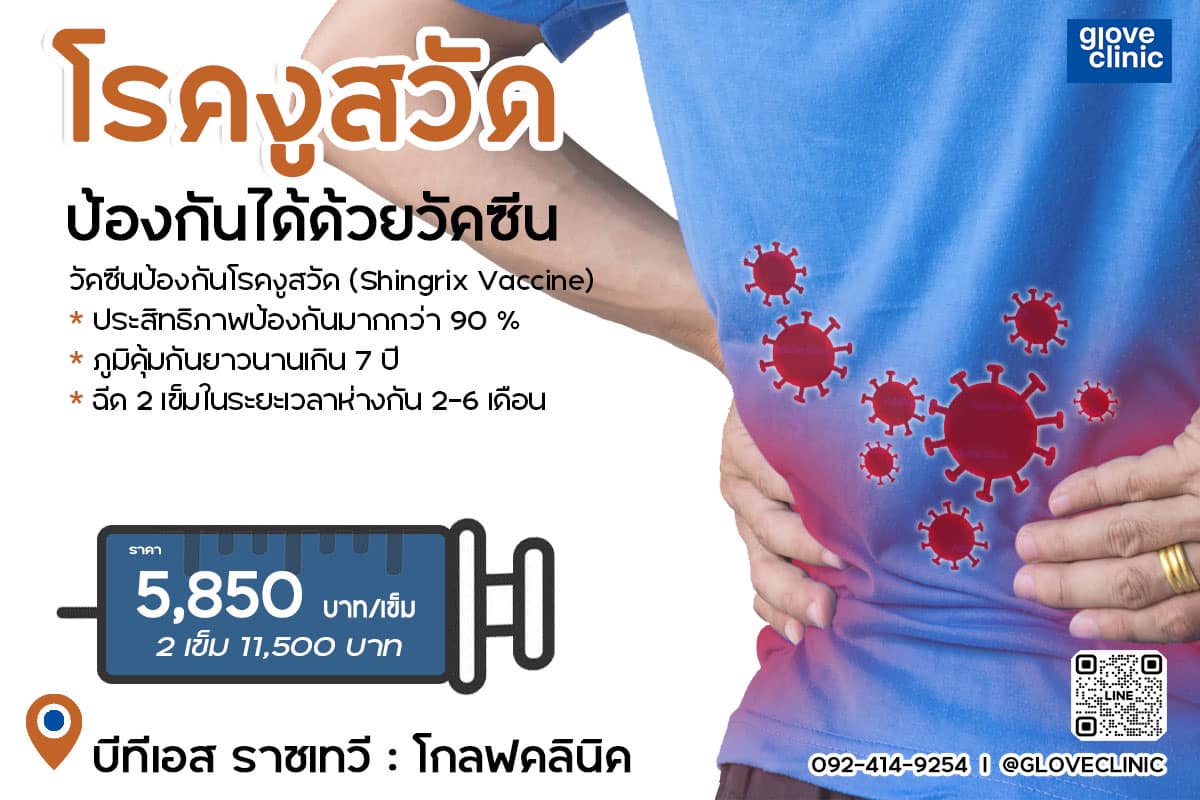
ฉีดวัคซีนงูสวัดที่ glove clinic
งูสวัดคือไวรัสชนิดหนึ่ง (Herpes zoster) ซึ่งเป็นเชื้อไวรัสตัวเดียวกันกับอีสุกอีใส (Varicella zoster) เมื่อเราติดเชื้อไวรัสอีสุกใสในวัยเด็กแล้ว ไวรัสสามารถที่จะหลบซ่อนได้ในร่างกายเป็นเวลานานหลายปี จนกระทั่งเมื่อร่างกายอ่อนแอ ไวรัสนั้นจึงออกมาทำให้เกิดอาการตุ่มน้ำใส ปวดแสบร้อนตามบริเวณที่เส้นประสาทต่าง ๆ ของร่างกายซึ่งเรียกกันว่างูสวัด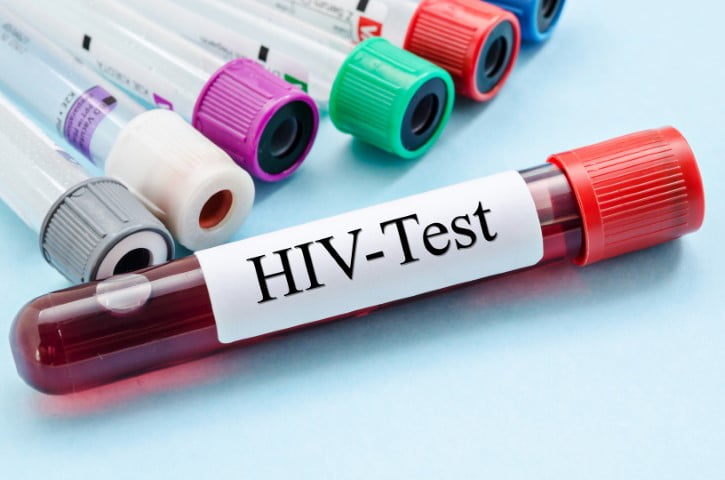
ตรวจ HIV รีวิวความรู้สำหรับการตรวจเอชไอวี (HIV test)
เอชไอวีคือไวรัสที่สามารถติดต่อได้จากการมีเพศสัมพันธ์, การใช้เข็มฉีดยาร่วมกัน, และการติดจากแม่สู่ลูก เมื่อติดเชื้อไวรัส HIV ไวรัสจะทำให้ภูมิคุ้มกันของร่างกายอ่อนแอลง และติดเชื้อโรคอื่น ๆ ได้ง่าย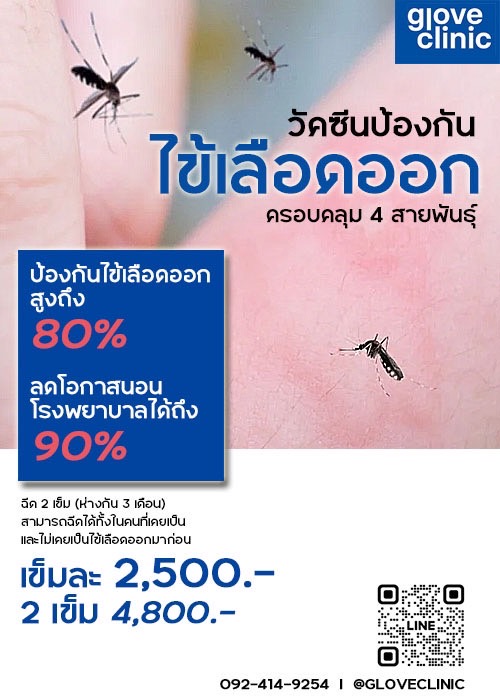
ปีนี้มีคนไข้ป่วยด้วยไข้เลือดออกมากกว่า 2-3 ปีที่ผ่านมา
เนื่องจากว่าผู้คนกลับมาใช้ชีวิตปกติ มีการเดินทาง จึงพบการระบาดมากขึ้น โดยจากสถิติของกรมควบคุมโรคพบว่ามีผู้ป่วยด้วยไข้เลือดออกในประเทศไทยเกินกว่า 60,000 รายไปแล้วทั้งปี 2566 ไข้เลือดออกเป็นโรคที่ก่อให้เกิดความรุนแรงได้ทั้งในเด็กและผู้ใหญ่ โดยเฉพาะอย่างยิ่งในคนที่เป็นซ้ำครั้งที่ 2 จะมีโอกาสเกิดภาวะช๊อคและเสียชีวิตได้มากขึ้น (โอกาสเสียชีวิตอยู่ราว ๆ 1:1,000) วัคซีนไข้เลือดออกรุ่นใหม่สามารถครอบคลุมได้ทั้ง 4 สายพันธุ์และทั้งนี้ผลการศึกษาพบว่าช่วยป้องกันการติดเชื้อได้ถึง 80% และลดโอกาสการนอนโรงพยาบาลได้ถึง 90% นอกจากนี้ยังสามารถฉีดได้ทั้งในคนที่เคยและไม่เคยเป็นไข้เลือดออกมาก่อน (วัคซีนไข้เลือดออกรุ่นเก่าไม่ควรฉีดในคนที่ยังไม่เคยเป็นไข้เลือดออก) สอบถามข้อมูลเพิ่มเติมเรื่องวัคซีนไข้เลือดออกได้ที่ 092-414-9254, Line Official @gloveclinic (มีแอดข้างหน้า)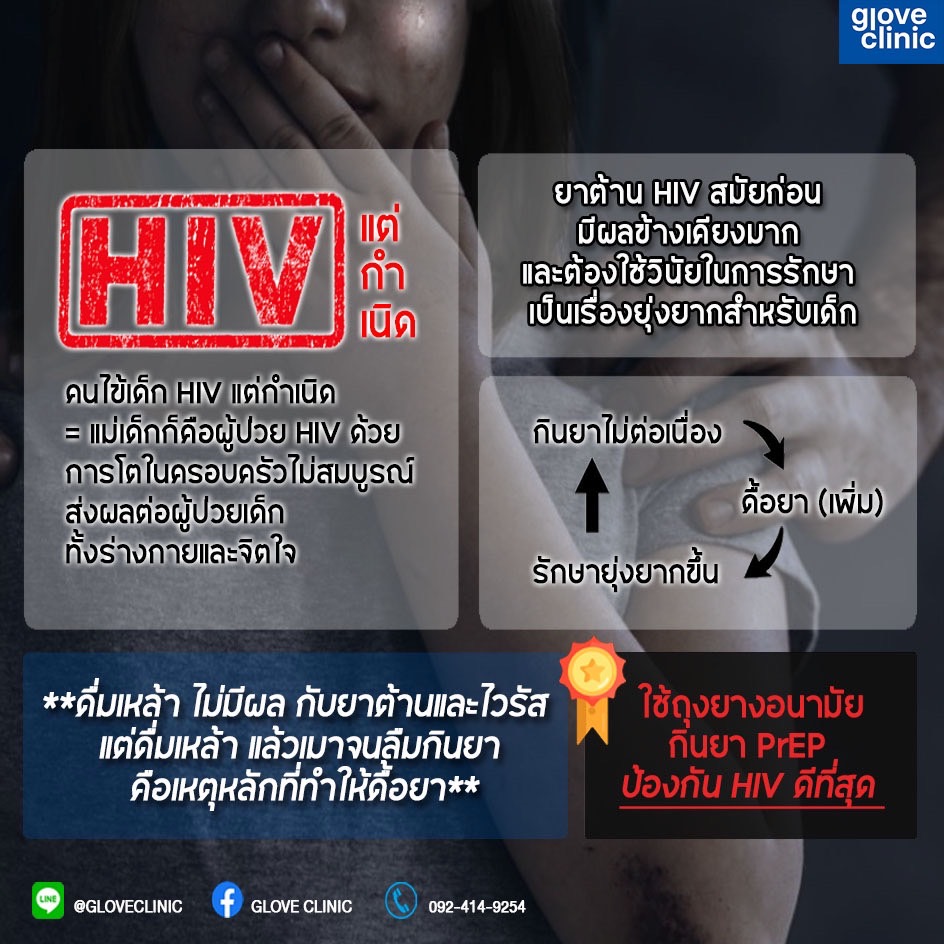
HIV แต่กำเนิด
ประเด็นร้อนที่ได้รับการพูดถึงอย่างมากในโลกออนไลน์ที่มีข้อความของนักศึกษาหญิงเปิดเผยว่าตัวเธอเองได้มีเพศสัมพันธ์แบบ one night stand เวลาไปเที่ยวกลางคืนบ่อยครั้ง และได้บอกความจริงว่าเธอเองมีเชื้อ HIV
อาการของเอดส์เป็นอย่างไร ทำความรู้จักกับเอดส์
เอดส์ คืออะไร แท้จริงแล้วเอดส์ไม่ใช่โรค หากแต่คือระยะสุดท้ายของการติดเชื้อ HIV ซึ่ง HIV นั่นเองคือไวรัสที่ทำลายภูมิคุ้มกันของร่างกาย โดยเซลล์หลักที่ถูกเล่นงานโดยไวรัสก็คือเม็ดเลือดขาว CD4 ซึ่งเป็นเซลล์ที่บัญชาการระบบภูมิคุ้มกันของร่างกาย ซึ่งเอดส์ในภาษาอังกฤษก็คือ AIDS ย่อมาจาก Acquired immunodeficiency syndrome กำเนิดของการเรียกชื่อว่าเอดส์ เดือนมิถุนายน ค.ศ. 1981 ในวารสารของกรมควบคุมโรค ประเทศสหรัฐอเมริกาได้รายงานว่ามีเกย์หนุ่ม 5 คนมีอาการปอดอักเสบจากเชื้อรา และได้รับการรักษาในโรงพยาบาลที่ Los Angeles โดย 2 รายเสียชีวิต และนอกจากนี้ทั้ง 5 คนยังพบการติดเชื้อไวรัส CMV และมีเชื้อราในช่องปากร่วมด้วย ซึ่งเชื้อต่าง ๆ ที่เล่ามานั้นมักเจอในผู้ป่วยที่มีภูมิคุ้มกันบกพร่อง ในขณะนั้นโลกยังไม่ได้รู้จักกับไวรัส HIV ว่าเป็นสาเหตุตั้งต้นของสิ่งที่เกิดขึ้น การเรียกภาวะนี้ในยุคแรกจึงได้เรียกว่า AIDS หรือ “เอดส์” ซึ่งย่อมาจาก acquired immunodeficiency syndrome อาการของเอดส์แตกต่างกับ HIV ยังไง เอดส์คือชื่อระยะที่ 3…